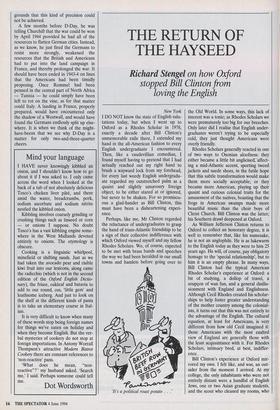Mind your language
I HAVE never knowingly kibbled an onion, and I shouldn't know how to go about it if I was asked to. I only came across the word when I looked at the back of a tub of not absolutely delicious Tesco's chicken liver pâté, and there amid the water, breadcrumbs, pork, sodium ascorbate and sodium nitrite nestled the kibbled onion.
Kibbling involves coarsely grinding or crushing things such as linseed or corn — or onions I suppose. No doubt Tesco's has a vast kibbling engine some- where in the West Midlands devoted entirely to onions. The etymology is obscure.
Cooking is a linguistic whirlpool, minefield or shifting sands. Just as we had taken the avocado pear and risible kiwi fruit into our lexicons, along came the radicchio (which is not in the second edition of the Oxford English Dictio- nary), the frisee, oakleaf and batavia to add to our round, cos, 'little gem' and loathsome iceberg. And just to look on the shelf at the different kinds of pasta is to take an elementary course in Ital- ian.
It is very difficult to know when many of these words stop being foreign names for things we've eaten on holiday and when they become English. But the ver- bal mysteries of cookery do not stop at foreign importations. In Antony Worrall Thompson's attractive Modern Bistrot Cookery there are constant references to °non-reactive' pans.
'What does he mean, "non- reactive"?' my husband asked. 'Search me,' I said. Perhaps someone could tell


























































 Previous page
Previous page